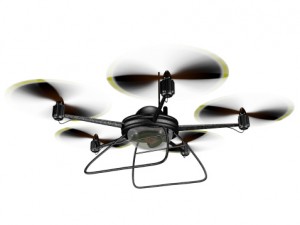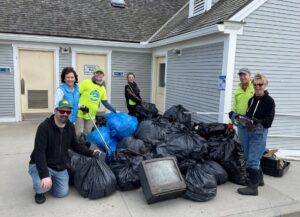 BOURNE – While hobbyists have been flying drones for more than a year, the Federal Aviation Administration is getting serious about putting together more defined rules for the unmanned aircraft systems or UAS.
BOURNE – While hobbyists have been flying drones for more than a year, the Federal Aviation Administration is getting serious about putting together more defined rules for the unmanned aircraft systems or UAS.
Joint Base Cape Cod has been chosen as one of the six test sites in the United States for the effort to put together the regulations and a local company, Avwatch, based in Plymouth, is working with the public entity MassDevelopment to lead the effort.
The goal is to develop safe standards for the integration of unmanned aircraft systems into the National Airspace System.
Griffiss International Airport in Rome, New York, will act as the partnership’s lead site with MassDevelopment managing testing facilities at Joint Base Cape Cod. The FAA will develop standards by 2015 that will include a focus on privacy for the safe integration of UAS into the National Airspace System.
The region’s top tourism official weighed in on the drone testing at the base.
“We are looking forward to the introduction of new firms and the high-tech jobs associated with UAS development here, which is enabled by the new high-speed broadband network proved through Cape Net and the OpenCape backbone,” said Wendy Northcross, CEO of the Cape Cod Chamber of Commerce. “We can also envision a great future with UAS supporting increased efficiency in the fishing industry of the Cape and new ways to support the conservation and protection of marine mammals as they move through Cape waters.”
“With the selection of Joint Base Cape Cod as a test site operator for the FAA’s Unmanned Aircraft Systems program, Massachusetts will be well positioned to be a national leader in development of the highest operational standards and strongest privacy protections for drones as they prepare to take flight in U.S. airspace,” said Senator Edward J. Markey in December when the announcement was first made. “This selection recognizes the importance of Massachusetts’ military installations and our special role as an innovation hub while helping the Commonwealth lead the way in this emerging, job creating space.”
US Congressman Bill Keating, whose district includes Joint Base Cape Cod, said, the announcement by the FAA “is a major step forward for Joint Base Cape Cod and a huge win for the entire Cape community. FAA’s designation only furthers our region’s commercial viability and leadership in research and development. This new project will not only create jobs and revenue, it also adds another dimension to the Base’s already-strong infrastructure, which is critical during a time of base closings across the country.”
According to MassDevelopment, Massachusetts and New York have the assets, resources, and experience to develop safe standards for civilian use of UAS and the integration of unmanned systems into national airspace. The Northeast region offers one of the premier locations for UAS testing due to the availability of airspace, weather, and landscape diversity, along with concentration of industry and academic expertise. Both states combined have access to more than 7,000 square miles of restricted and special use airspace for all levels of UAS testing.
The test site areas in Massachusetts will include the restricted airspace over Joint Base Cape Cod and in the Warning Areas over the waters off Massachusetts. The Upper Cape base currently has underutilized space that can be made available for the testing site, including office space, hangars, and parking areas.
“The selection of Joint Base Cape Cod as an FAA test site working with partners in the Northeast region is exciting and recognizes the strategic value of our Massachusetts military installations to our national defense,” said Major General L. Scott Rice, The Adjutant General of the Massachusetts National Guard. “Joint Base Cape Cod continues to develop its portfolio as a high-tech training and educational site for both the public and private sector thanks to the tireless work of the Massachusetts Military Asset and Security Task Force and MassDevelopment,” said Rice.
“The 102d Intelligence Wing has much to offer in the way of building partnerships, particularly in the testing environment,” said Colonel Jim LeFavor, Commander, 102d Intelligence Wing, Otis Air National Guard Base, MA. “Lately, we have been engaged with multiple in-state and federal agencies who have taken advantage of our offer to ‘host’ them for different projects. One of our main commodities is plenty of space and willingness to assist. We welcome having the FAA test site here, as it will further our vision of the transformation and growth of JBCC and the 102d Intelligence Wing into a true ‘multi-nexus’ installation.”
Massachusetts and New York partnered with the Northeast UAS Airspace Integration Research Alliance (NUAIR), a consortium of more than 40 public entities, private industry, and academic institutions in both states. This alliance partnered with the Commonwealth of Massachusetts and Griffiss International Airport, Rome, New York and Oneida County, New York to respond to the Federal Aviation Administration’s request for qualified applicants to run an FAA Test Site. Organizations partnering with MassDevelopment, Griffiss International Airport, and NUAIR include Saab Sensis, SRC, Raytheon, Lockheed Martin, Rochester Institute of Technology, Massachusetts Institute of Technology, Syracuse University, Clarkson University, and Northeastern University, among others.
“The DOT looks forward to working with the NUAIR team in this endeavor,” said MassDOT Secretary and CEO Richard A. Davey. “Massachusetts has been and will continue to be at the forefront of innovation with the implementation of this exciting project.”
“MassDevelopment is pleased to work with our New York partners on this test site,” said MassDevelopment President and CEO Marty Jones. “Massachusetts military installations are an important part of the Commonwealth’s economy, and I would like to thank the FAA for its recognition and support of our work at Joint Base Cape Cod.”
“The FAA’s designation of New York and Massachusetts as a UAS test site recognizes the tremendous expertise and assets our region offers to this rapidly growing industry,” said Robert M. Simpson, chairman of NUAIR and president of CenterState CEO in Syracuse. “The NUAIR team has assembled an unparalleled group of industry and academic partners and physical assets, aligning them with some of the nation’s most diverse and ideal airspace for testing. This effort has benefitted tremendously from the leadership of Senator Schumer and the entire New York and Massachusetts delegations.”
According to MassDevelopment, UAS is an emerging industry that will offer increased efficiency, enhanced safety, and cost savings in many fields. Congress mandated that the FAA develop rules for integrating UAS into the national airspace system by 2015. Civil and commercial uses of UAS include agriculture, disaster relief, environmental research, and pipeline surveillance. The FAA is looking for places of varying climates and geography to test how to incorporate unmanned aircraft alongside private, commercial, and military planes and helicopters.
The UAS industry is projected to create an estimated 70,000 new jobs nationwide by 2017 and more than 100,000 by 2025. Total U.S. economic impact of the UAS industry will reach $82 billion by 2025 according to the Association for Unmanned Vehicle Systems International. Massachusetts can expect an increase of 985 jobs and economic impact of $386 million while realizing tax revenues of $3.8 million between 2015 and 2017. A study by the Association of Unmanned Vehicles Systems International shows that Massachusetts is expected to receive about 2.9% of all manufacturing growth attributed to the increase use of UAS, ranking it 11th of the 50 states. The FAA UAS test sites will attract many of these jobs and investment to regions in which they are located.
In anticipation of Massachusetts’ potential selection, MassDevelopment and the Massachusetts National Guard established the MA UAS Test Center on Camp Edwards and began to host active UAS use in the restricted airspace over the Army Guard’s training area. That program was introduced in anticipation of Massachusetts and New York putting in a bid to become one of the FAA’s testing sites. Being named a Test Site will now streamline the Certificate of Authorization process that will allow operators to increase the size of the systems that can fly at Joint Base Cape Cod.
The NUAIR partnership was selected as one of six site recipients from a competitive group of 25 applications nationwide. In addition to the Massachusetts and New York selection, other sites selected today by the FAA are the University of Alaska, the State of Nevada, the North Dakota Department of Commerce, Texas A&M University – Corpus Christi, and Virginia Polytechnic Institute and State University (Virginia Tech).
Listen below as MassDevelopment’s Vice President of Defense Sector Initiatives Carter Hunt and Chris Kluckhuhn of Avwatch discuses the drone testing program on the base.























